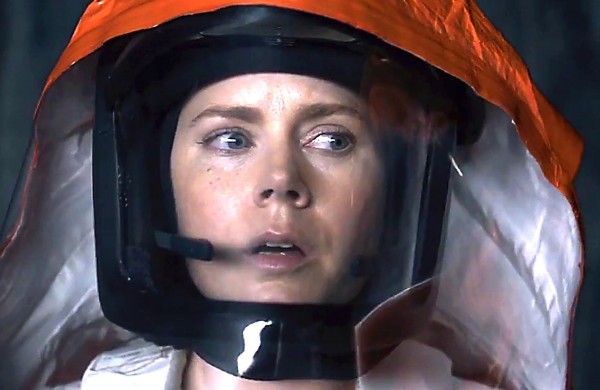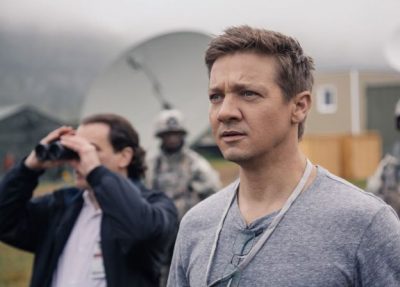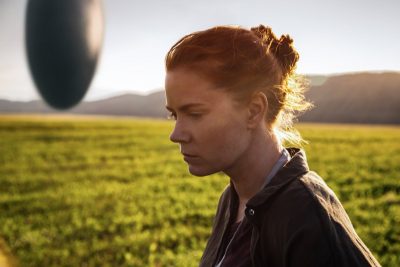
“Arrival” – a film review by Gary Chew
I begin these comments with a question that’s not spoken until nearly the end of Arrival, the new film by Canadian director Denis Villenueve.
“If you could see your life from beginning to end before you die, would you change anything?”
The question isn’t asked for a reply, but primarily to introduce the contemplation of that query to your mind… as it helps tie together all that’s opaquely been flying at you over the course of an entire movie Villenueve has wrapped in a familiar “aliens-come-to earth” package; and has much more to do with language, love, communication and the will to fully understand a message than mere science-fiction or voodoo.
 That’s why, as one could say, “the CGI isn’t so spectacular” with the sudden arrival of a dozen giant pod-like space vehicles at widespread locations across the earth. At one angle, hanging there in the sky barely above our planet’s surface, the pods look like gigantic surf boards; or if perceived from a more horizontal view, chubby gray bananas.
That’s why, as one could say, “the CGI isn’t so spectacular” with the sudden arrival of a dozen giant pod-like space vehicles at widespread locations across the earth. At one angle, hanging there in the sky barely above our planet’s surface, the pods look like gigantic surf boards; or if perceived from a more horizontal view, chubby gray bananas.
To be sure, there are aliens inside. And the pods occasionally emit basso profundo honks reminiscent of Spielberg’s Close Encounters of the Third Kind. Villenueve’s aliens are more of the octopus variety, though. When they talk, if that’s what they’re doing (also in a creepy, throaty tone), ink seems to spew from them and form strange circular designs that finally prove to be the key to understanding what they’re saying to earthlings.
It’s the job of language professor and author, Dr. Louise Banks (Amy Adams) to get to the bottom of all the chit chat emerging from these frightful looking creatures who appear in a cavernous rectangular space inside the pod that’s arrived on U.S. soil in Montana. She and Ian Donnelly (Jeremy Renner), a math and science whiz, are the pair that the U.S. military has quasi-kidnapped for this top secret project. But there are plenty of the usual war assets to keep all of it as safe as possible.
 What is the intent of this alien visit? Major nations are, as usual, flustered in disagreement as how to handle the ominous presence. What about Russia? What about China? Should the U.S. share data with other governments? China appears to be effecting a hair trigger reply. Be glad that this fantasy isn’t happening with Donald Trump being written into the Oval Office.
What is the intent of this alien visit? Major nations are, as usual, flustered in disagreement as how to handle the ominous presence. What about Russia? What about China? Should the U.S. share data with other governments? China appears to be effecting a hair trigger reply. Be glad that this fantasy isn’t happening with Donald Trump being written into the Oval Office.
But, Dr. Banks’ personal background starts the film. She’s shown as the mother of a small girl who dies at the outset. Banks is in deep grief; then the pace picks up to confront the possible threats the pods make on the world community. Intermittent moments depicting mother and child flash among the stressful efforts Banks and Donnelly make on behalf of the government and the demands of a spit and polish Colonel Weber (Forrest Whitaker).
Arrival is loaded with abstractions and makes any of the script’s clarification, scene after scene, not much better than murky. At the end, when Banks puts it together, we come to know that the aliens in the big pod are not just in the same time zone as humans. Their ability to communicate includes zones of times past and times future. Get your head around that one.
There’s a pay off for all of it, though. And if you ask yourself that question mentioned in an early paragraph, it will tend to make things clearer about what your answer might be.

- Movie Review: ‘The Glorias’ - September 28, 2020
- Movie Review: ‘I’m Thinking of Ending Things’ - September 10, 2020
- Movie Review: ‘The Burnt Orange Heresy’ - August 31, 2020

